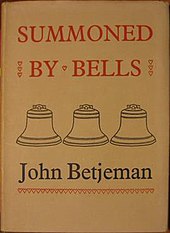Summoned by Bells
Appearance

Summoned by Bells, the
middle-class home in Edwardian Highgate, London, to his premature departure from Magdalen College, Oxford
.
The book was first published in November 1960 by Betjeman's London publisher,
There is also a
BBC film version directed by Jonathan Stedall for television in 1976.[3]
In an autobiography covering the life of Betjeman before he started his first job, narrated in blank verse by him, Betjeman visits places that played an important part in his early life.
Synopsis
- Chapter I Before MCMXIV — Memories of the nursery, realisation of class. You could:
- looking up socially
But what of us in our small villa row
Who gazed into the Burdett-Coutts estate?
I knew we were a lower lesser world …
- looking down socially and geographically
Glad that I did not live in Gospel Oak.
- Chapter II The Dawn of Guilt — The author prefers poetry to his father's fascinating workshop; early lines.
- Chapter III Highgate — His love for Miss Peggy Purey-Cust; trouble with bullies.
Betjeman's a German spy—
Shoot him down and let him die:
- Chapter IV Cornwall in Childhood — To Cornwall by rail, evocative sounds and smells of childhood holidays.
- Chapter V Private School — To the Dragon School in Oxford; bicycling to look at church architecture.
- Chapter VI London — John's father is doing well, they have moved to Chelsea, "the slummy end"; but he preferred leafy Hampstead.
- Chapter VII Wiltshire Downs; manages poetry better than painting.
- Chapter VIII Cornwall in Adolescence — To Cornwall by road, adolescent family troubles, and bicycling independently to explore Cornish churches.
- Chapter IX The Opening World — Up to Magdalen College, Oxford, influences, hobnobbing, versifying, failing at Holy Scripture.
Places mentioned in the book
- St Ervan (In the cool shade of interlacing boughs, I found St Ervan's partly ruined church…)
- Trebetherick
- Pembroke College, Oxford
- Sezincote
A Ring of Bells
In 1962 Betjeman released an abridged version of the book for children, with illustrations by Edward Ardizzone.
See also
References
- ISBN 0-7195-4696-6.
- ISBN 978-0-7195-6031-6.
- ^ Summoned by Bells with Sir John Betjeman, BBC DVD, 2007.
